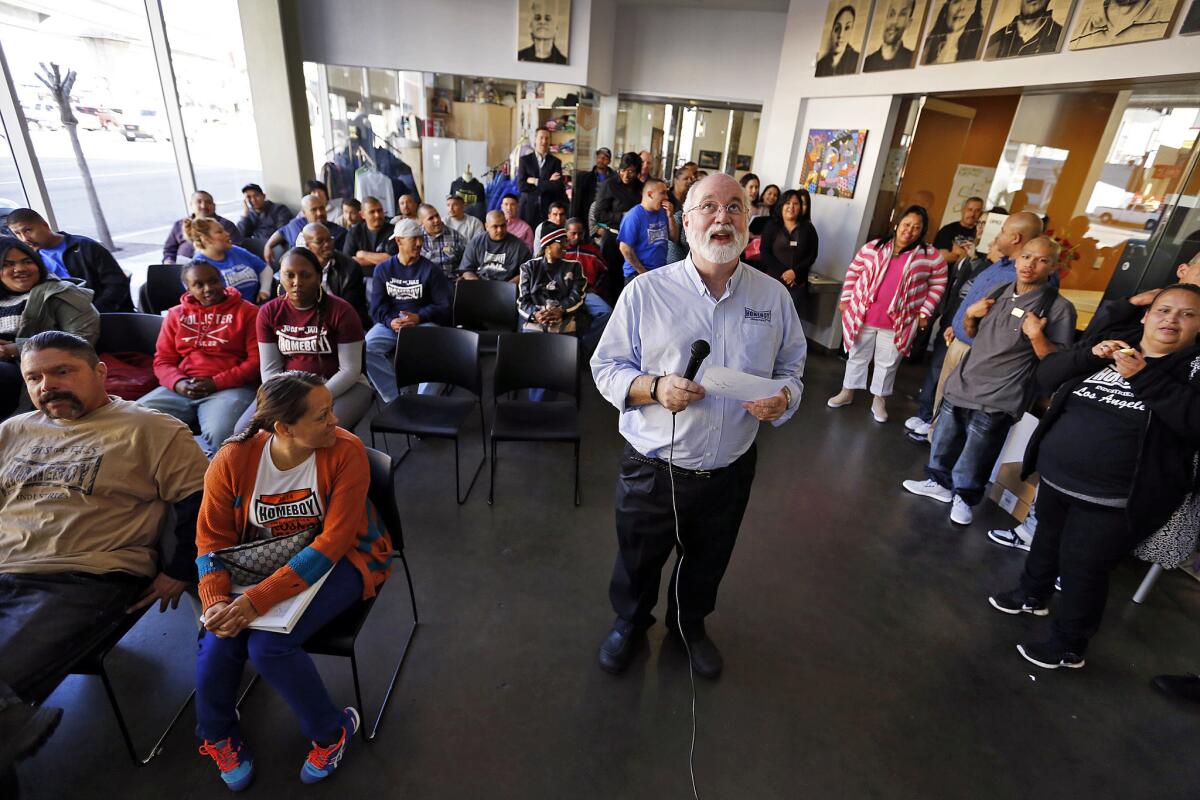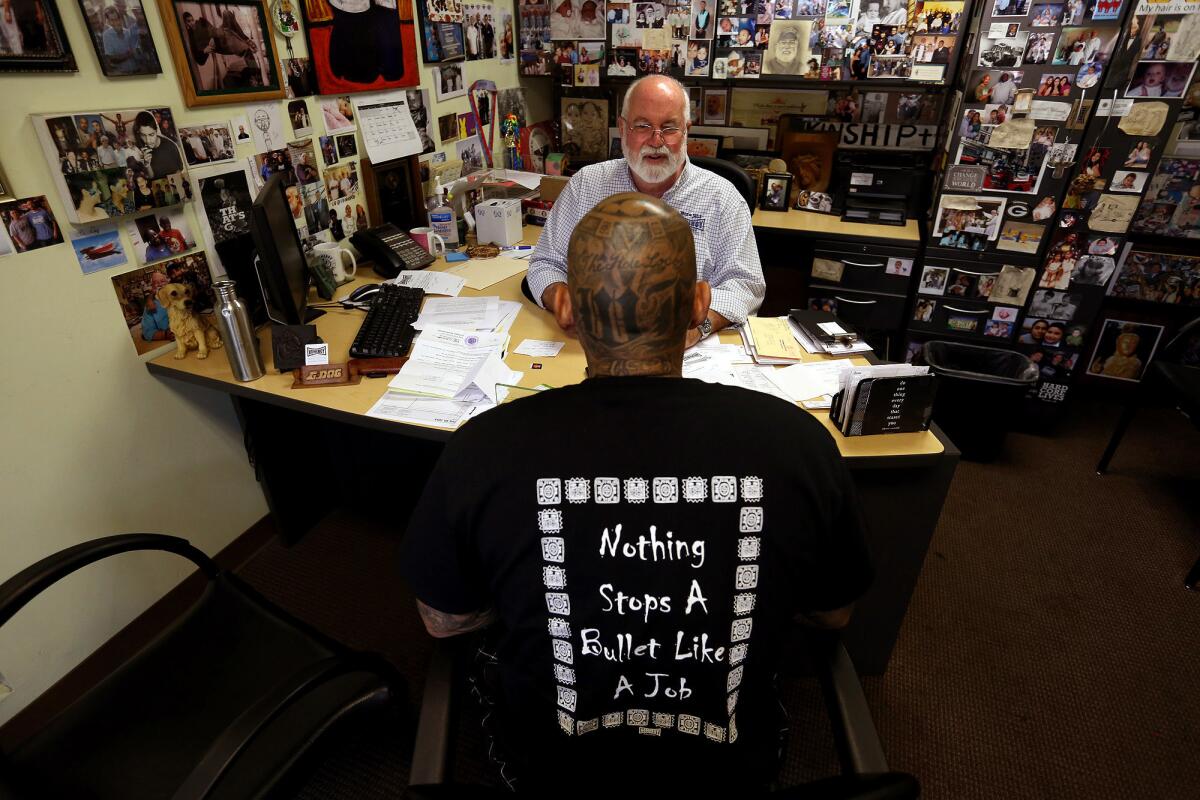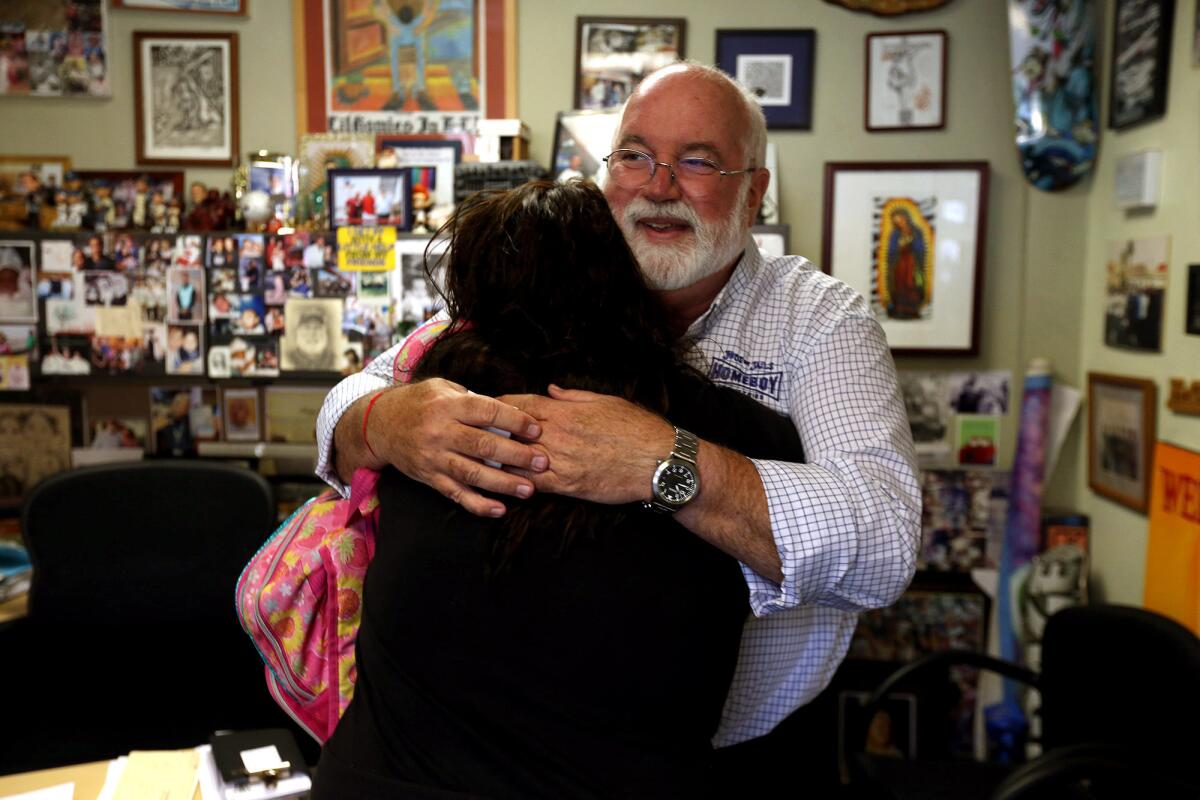Column: A homie, a volunteer and a message of radical kinship from Father Greg Boyle

- Share via
I dropped by Homeboy Industries to check in with Father Greg Boyle and to go over the details of our appearance together at the L.A. Times Festival of Books on Saturday.
But first things first. Homeboy has a morning ritual. Everyone gathers in the foyer of the big yellow building near the Chinatown Metro Station. Staff, volunteers, visitors, young clients trying to escape gang life. And then come the daily announcements.
Coffeecake was the bakery special, chicken pozole the Homegirl Cafe lunch special, the tattoo removal center would be open soon. And a prayer was offered for five female gang members headed to a retreat.
Boyle, the L.A. kid-turned-Jesuit priest who has devoted the last 30 years of his life to this work, has hundreds of stories in his quiver. On Monday, he told the daily gathering the one about a “dearly deported” homie who got out of lockup and was sent to El Salvador, a foreign country in more ways than one, where people spoke a language he barely knew. On his way back north, Boyle said, he was mugged, robbed, stripped naked and taken in by strangers in Mexico.
“Here’s some boxers, here’s some socks, here’s a pair of pants, shirt, shoes. They feed him and he’s so stunned … that in the middle of nowhere … he is clothed by their reverent kindness,” Boyle said.

“What goes around comes around,” the padre continued, telling those assembled that the homie took a vow that day to return the kindness, and to get back home on the power of that thought.
“We want to choose each day and with each other to be reverent because it will soften how we see each other,” Boyle said. “And that will lead to cherishing, and that will lead to a joy you’ve never experienced. Amen.”
As the gathering broke up and the day’s activities began, two people came up to me.
A young man named Alex, who said he walked away from the MS-13 gang not long ago, wanted to comment — to my surprise — on a column I wrote nearly 13 years ago. It was about my getting a haircut from Arnold Schwarzenegger’s barber.
“That was my favorite,” he said, and I had trouble suppressing a smile. “I used to read the paper, but I’m sorry to say it’s too expensive now.”
The other person who said hello was Joani Noneman. She said that she was a retired nurse, and that she had been volunteering in the tattoo removal clinic one day a week for six years.
I’ll get back to the homie and the nurse in a minute.
Father Boyle and I had coffee at Homegirl Cafe and talked about his “Barking to the Choir: The Power of Radical Kinship,” the book we’ll be discussing Saturday. In it, Boyle does what he does best: He preaches without preaching, trusting that there is no more powerful form of commentary than the telling of stories that shake our notion of who we are, or who the other guys are.
In Boyle’s heart, humility resides, and with the pen of a poet, he introduces us to the young men and women who stumble into Homeboy like soldiers from the frontlines, damaged by violence, abuse, abandonment, poverty, mental illness and the casualties inflicted by their own rage.
Boyle says in the book that he’s been accused of coddling criminals, but he thinks of Homeboy as the world’s largest gang intervention, rehab and reentry program, and thousands of men and women have left lives of crime behind and found jobs with help from Homeboy.
Boyle stands with them, on the margins, yesterday, today and tomorrow, opening doors instead of slamming them shut. He gives them an ear, he gives them prayer, he gives them a chance to decide they’re done with one thing and ready for another.
“No hopeful kid has ever joined a gang,” Boyle writes. “No kid is seeking anything when he joins a gang, he’s always fleeing something.”

Joani Noneman had retired from nursing and wanted to find a cause to volunteer for. Her father, late UCLA researcher and philanthropist James B. Peter, had donated to Homeboy and she wanted to see what the nonprofit did, so she took a tour. When she saw the tattoo removal clinic, run by volunteer doctors and other medical staff, she signed up.
“I’m a 60-year-old white woman and I would go into the morning meetings and sit in my little chair, and what I was most afraid of was that they wouldn’t accept me,” Noneman said. “Slowly but surely I was able to come out of my shell and was totally embraced by the community. Now I feel it’s my home away from home.”
Tattoo removal by laser is a painful procedure — like constant burns from splattering bacon grease, Noneman said — that requires multiple visits. Noneman said this gives her a chance to listen to stories, which can serve as a distraction from the pain. She remembers a woman who said she had been trafficked by a pimp who branded her with a tattoo on her back.
“The lower back can be a very, very painful area to remove a tattoo … and she was crying,” Noneman said. “I said, ‘I’m sorry, you can do this, I’m working you through it.’ She said, ‘No, it’s not that. I’m crying because I’m remembering what all this means, and I’m so grateful to have it off of me.’ ”
The day after I met with Boyle, I went back and found Alex working in the Homeboy store, where shirts and hats and other gear are sold to help support the programs. I asked how he came to know Boyle.
Alex looked away. He seemed as though he might crack, but he didn’t.
“I was 11,” he said. “It was in juvenile hall.”
Alex said he joined a gang when he was 10 because it seemed safer than what he dealt with at home. Boyle told him to stay in touch, but the boy wasn’t ready to break free. Alex stuck with the gang into adulthood and that was a gateway to jail and prison. He saw Boyle now and then, and he recalls never feeling judged. Boyle simply connected, always coming in with his “How you doin’, son” greeting. He asked Alex to get in touch when he was ready to give something new a chance. And he always said “I love you.”
Alex said he couldn’t get over that level of kindness from a virtual stranger, and when he got out of prison in September, he went to Homeboy to sign on for the 18-month program. Not long ago, he said, a homie from his old gang enrolled but wasn’t ready to commit. The old friend couldn’t believe Alex had rejected the old ways.
“No,” Alex told him. “I’m out.”
Within two months, they had different things to talk about.
“Now we’re discussing college and resources and plans,” said Alex, who wants to get the college education he never got, and he’s already enrolled. What he’d really like to do, he said, is get a degree, come back one day and do for others what Homeboy is doing for him. He wants to run the place for Father Greg.
Not long ago, Alex said, a former rival entered the program.
“He shot me,” Alex said. “Back in 2002.”
I asked where he was shot. Alex started on his right arm, near the elbow.
“This is an exit wound here,” he said, then he moved to the scars on his left arm. “And my hands, too. And my back.”
I asked if he gets along now with the guy who sprayed him with bullets.
“I smoked a cigarette one day and he got angry with me,” Alex said as a smile creased his face. “Now he cares about my health.”
Steve Lopez will appear with Greg Boyle on the L.A. Times Main Stage at 10:30 a.m. Saturday and with columnists Chris Erskine, Robin Abcarian and Frank Shyong on the L.A. Times Live Stage at 3:40 p.m. Saturday.
Get more of Steve Lopez’s work and follow him on Twitter @LATstevelopez
More to Read
Sign up for Essential California
The most important California stories and recommendations in your inbox every morning.
You may occasionally receive promotional content from the Los Angeles Times.











